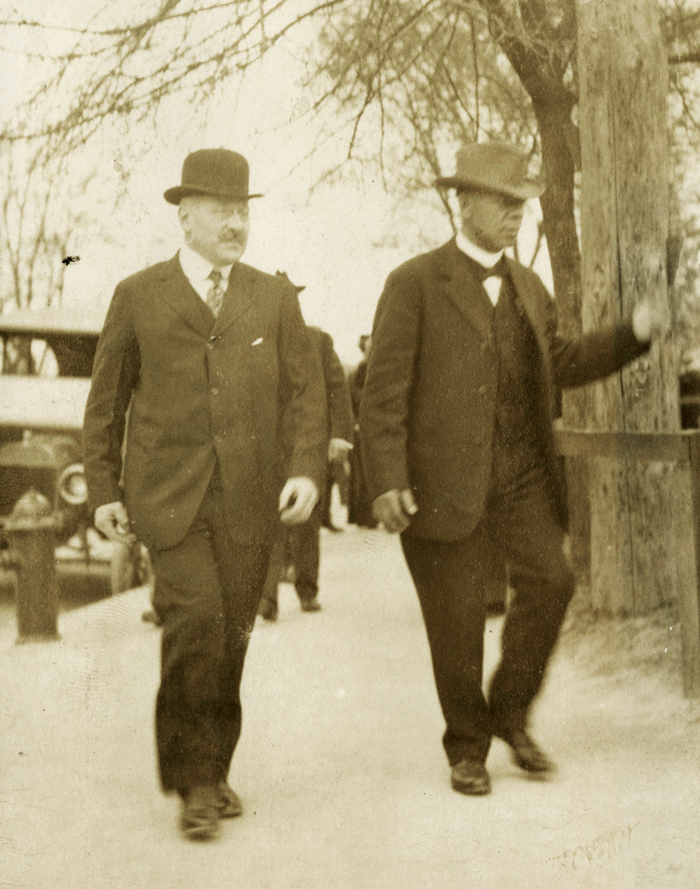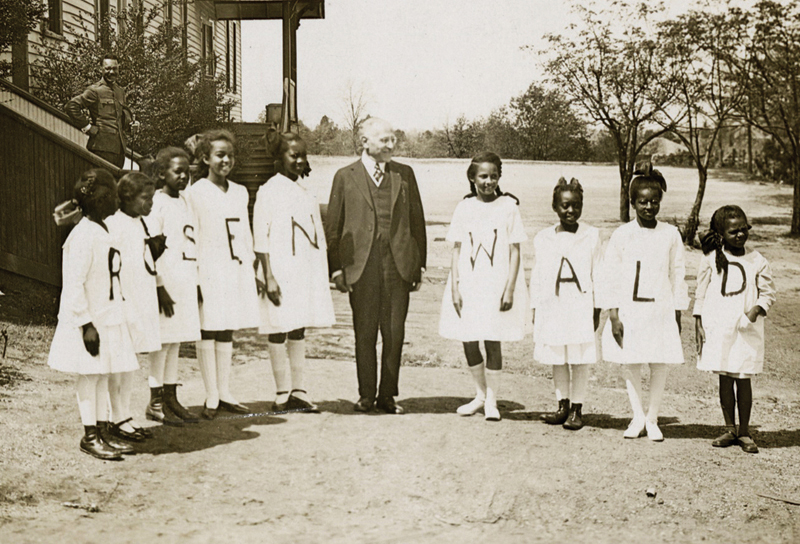lives
ROSENWALD
by ARI L. GOLDMAN

Above: Julius Rosenwald and Booker T. Washington, Tuskegee Institute, 1915.
Below: Julius Rosenwald with students from a Rosenwald school.
P hilanthropists are not the most likely subjects for film documentaries. Their lives might well be full of merit and virtue, but their stories often lack the drama that make for riveting movies.
But Aviva Kempner has done something unusual — and compelling — in her new film Rosenwald, a 95-minute documentary about the life and work of Julius Rosenwald, the son of a Jewish immigrant peddler who never finished high school but rose to become president of Sears, Roebuck and Company.
Kempner, best known for The Life and times of Hank Greenberg, accomplishes this by not telling only Rosenwald’s history, but also the story of the era in which he lived and the thousands that he touched through his philanthropy. Rosenwald, who died at the age of 69 in 1932, gave away $62 million in his lifetime, the equivalent of roughly $1 billion today.
Rosenwald was deeply touched by the plight of African-Americans in the Jim Crow South (and later in the North) and it was to that community that he directed most of his generosity. At a time when there were few opportunities for black children to get a decent education, Rosenwald partnered with African-American communities to build more than 5,300 schools, especially in the South. These were known as “Rosenwald Schools.” He also helped build dozens of YMCAs for African-Americans to address the pressing needs of the Great Migration. And, through the Rosenwald Fund, he helped nurture the talents of hundreds of black artists, writers and performers.

The list of African-Americans he helped reads like a Who’s Who of Black America. They include the artists Jacob Lawrence, the singer Marian Anderson, the photographer Gordon Parks, the writer Maya Angelo, Congressman John Lewis and the Nobel Prize winner Ralph Bunche.
Rosenwald, a member of the Chicago Sinai Congregation, was inspired by Dr. Emil G. Hirsch, a politically progressive Reform rabbi who helped establish the NAACP in 1909. From the rabbi he learned the principle of tikkun olam, repairing the world, and spent his life pursuing that goal.
Rosenwald funded agricultural programs in pre-state Palestine and was a major supporter of Jewish causes in Chicago, but his legacy was his outreach to a race other than his own. “The Rosenwald Fund was the single most important funding agency for African-American culture in the 20th century,” the poet Rita Dove says in the film.
Kempner, who interviewed dozens of people, including Rosenwald’s descendants, said that she knew little about his life until she heard the civil rights activist Julian Bond speak about him in 2003. “Julius Rosenwald was someone who 100 years ago did what he did because it was the right thing to do,” Kempner said in an interview. “I didn’t expect it would take me 12 years to make the film, but the issues it addresses are more relevant than ever. In today’s world we continue to struggle with racism and income inequality, especially in our major cities.”
Kempner said she was drawn to the story because it goes against the stereotype of the Jew as hostile or uncaring to minorities, especially in the years before and after the Civil Rights Movement of the 1960s, when there was a brief but strong alliance between Blacks and Jews. Rosenwald demonstrates that the alliance had deep roots — and suggests that perhaps it can be revived.
Kempner’s earlier films also explore non-stereotypical images of Jews. Her documentary Partisans of Vilna goes against the notion that Jews didn’t resist Nazi occupation. The film is the story of the heroic endeavors of Jewish resistance fighters. Kempner’s film about Hank Greenberg shatters the stereotype that Jewish men are nebbishy weaklings who are bad at sports. Greenberg was a Baseball Hall of Famer, one of the game’s greatest sluggers, who fought anti-Semitism in the 1930s and 1940s. And her film Yoo-Hoo, Mrs. Goldberg is about a strong Jewish woman, both on screen and off. That woman, Gertrude Berg, fought against the McCarthy-era blacklist and paved the way for women in the entertainment industry. Shows like I Love Lucy, the Honeymooners, Seinfeld and Friends were in many ways descendants of The Goldbergs.
The new film on Rosenwald has been shown at more than 100 venues, including theaters, film festivals and community centers, and has won considerable praise. Kempner hopes that it can inspire greater cooperation between blacks and Jews. “The film resonates in the philanthropic community,” she added. “At one screening of Rosenwald, a young man asked me, ‘How did he know to do this?’”
She added: “Not everyone can give away $62 million, but everyone can find the Rosenwald within them.” ■
Ari L. Goldman, a professor at the Columbia University Graduate School of Journalism, is an editorial consultant for CONTACT. He is the author of four books, including The Search for God at Harvard and The Late Starters Orchestra.
| PREVIOUS ARTICLE | NEXT ARTICLE |